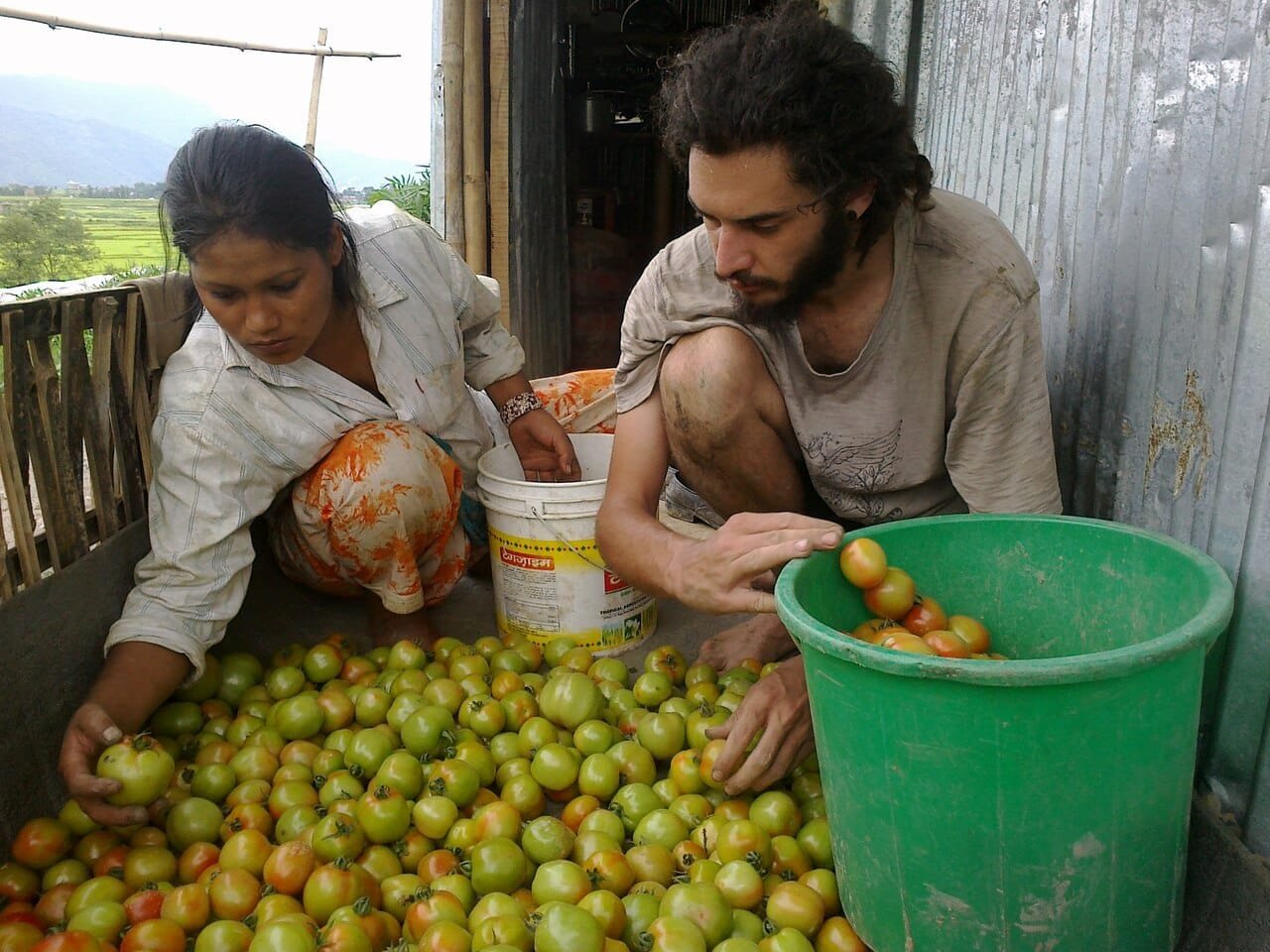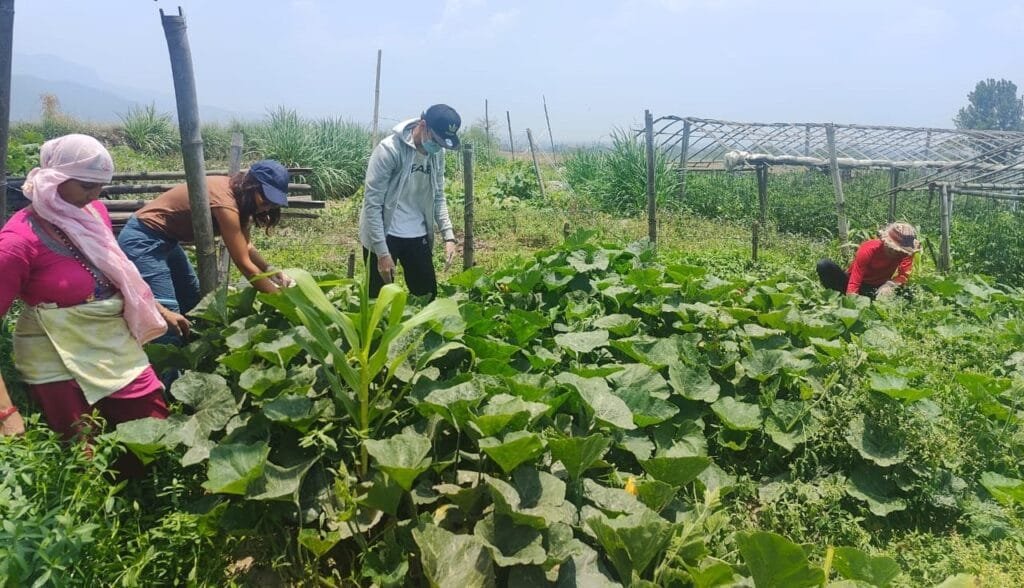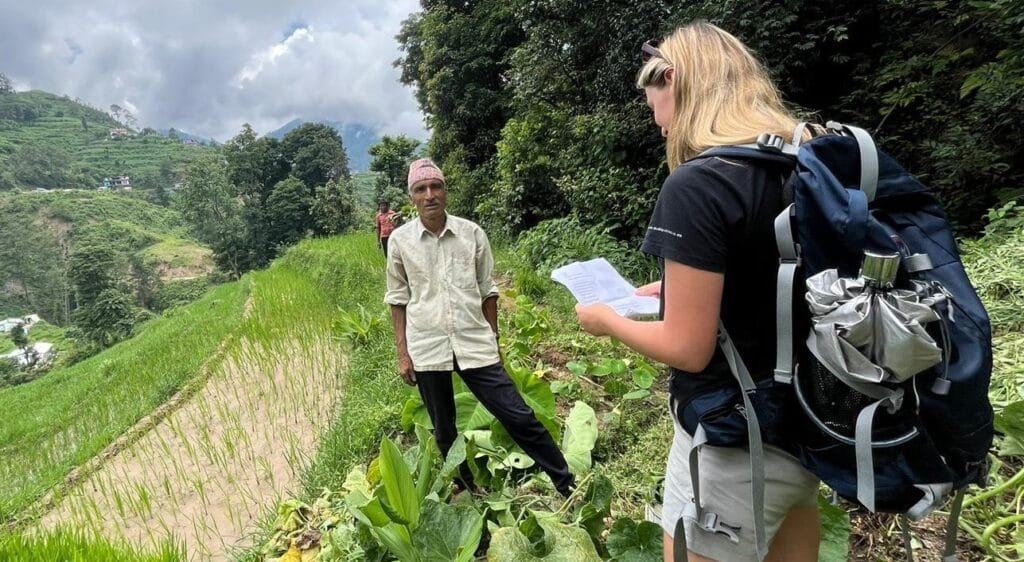Quick Highlights:
- Seven specialized environment-focused tracks, from Permaculture Volunteering to Wildlife Conservation Volunteering
- Grassroots approach: living among local families, daily hands-on activities
- Perfect for environment enthusiasts, students, professionals, or families seeking meaningful adventures
Introduction
Imagine trekking into the verdant hills of Nepal, planting trees alongside local farmers, or guiding a Community Gardening Volunteer workshop to revitalize degraded soils. Now, picture introducing new Sustainable Living Volunteer Opportunities methods or launching an Organic Farming Internship that teaches eco-friendly cultivation to rural villagers. You combine purposeful travel with direct ecological action through these immersive Environmental Conservation Volunteer Opportunities. Each day, you’ll help preserve biodiversity, champion climate-smart farming, and equip communities to thrive sustainably.
The Urgency
The Urgency of Environmental Conservation
1. Why Environmental Conservation Volunteer Opportunities Matter
Deforestation, habitat loss, and climate change jeopardize delicate ecosystems worldwide. The UN’s FAO warns that deforestation accounts for nearly 10% of global greenhouse gas emissions, with regions like Nepal—renowned for its Himalayas and biodiversity—bearing acute impacts. Rural communities reliant on traditional farming or foraged goods face new challenges. Environmental Conservation Volunteer Opportunities respond to these threats by aligning international volunteers with local efforts in reforestation, Sustainable Development Volunteering, and more.
Nepal stands at an ecological crossroads. While mountain landscapes hold unique flora and fauna, human encroachment, unsustainable practices, and climate shifts can degrade them quickly. By engaging in a Volunteer Organic Farming Program or Reforestation Volunteer Program, you help combat these problems. Each volunteer project fosters synergy among local farmers, NGOs, and eco-minded travelers, weaving sustainable solutions into daily life.
2. Our Unique, Community-Led Approach
Unlike short stints focusing on a single plantation drive, we embed volunteers in longer-term solutions. A Sustainable Agriculture Volunteer might assist entire villages with permaculture strategies, integrating forest edges with farmland to reduce soil erosion. Meanwhile, a Conservation Volunteer Abroad post might involve local ranger training or Habitat Restoration Volunteer tasks in endangered regions. This synergy cements deeper social and environmental roots, ensuring communities remain resilient even after volunteers depart.
Explore Our Environmental Conservation Volunteer Opportunities
Our environmental portfolio focuses on bridging local knowledge with volunteer enthusiasm. Whether you prefer teaching eco-friendly farming or safeguarding threatened wildlife habitats, we offer an opportunity that resonates.
-

Agroforestry Volunteer Program Nepal
- Focus: Combine trees with crops or livestock to diversify yields, enhance soil health, and reduce carbon footprints.
- Activities: Plant fruit or fodder trees in farmland, advise on effective intercropping or measure carbon sequestration.
- Why It Matters: Agroforestry can restore nutrient cycles, prevent soil erosion, and supply timber or fruits, balancing short- and long-term community needs.
-

Sustainable Agriculture Volunteer in Nepal
- Focus: Improve local farming methods through organic inputs, crop diversification, and minimal chemical usage.
- Activities: Set up compost systems, train families in integrated pest management, and share knowledge on regenerative soils.
- Why It Matters: Healthier soils yield robust crops, boosting nutrition and income while preserving local biodiversity.
-

Permaculture Volunteering
- Focus: Implement holistic land design, merging crops, livestock, water systems, and natural habitats.
- Activities: Build terraced gardens, create water catchments, demonstrate guild planting or companion crops.
- Why It Matters: Permaculture fosters resilience, ensuring farmland or gardens remain productive, even under harsh conditions.
-

Environmental Conservation Volunteer
- Focus: Support field research on pollinators, biodiversity indices, or climate change impacts.
- Activities: Collect data, deploy sensor equipment, record field observations, and help local ecologists interpret results.
- Why It Matters: Data-driven insights shape policies, such as establishing protected areas or shifting irrigation patterns to support threatened species.
-

Volunteer Organic Farming
- Focus: Transition smallholders from conventional methods to fully organic, pesticide-free farming.
- Activities: Test homemade bio-fertilizers, hold workshops on organic certification steps, or cultivate pilot demonstration plots.
- Why It Matters: Organic produce commands higher market value while preserving ecosystems. Families gain stable livelihoods and safer living conditions.
Benefits
Benefits & Impact
1. For Volunteers
- Hands-On Ecological Skills: Learn everything from composting to reforestation in actual conditions. Perfect if you’re pursuing environmental studies or want to broaden your skill set.
- Cultural Immersion: Connect intimately with farmers, park rangers, or activists, gleaning Nepali cultural insights beyond tourist trails.
- Personal Fulfillment: Enjoy seeing direct outcomes—like a flourishing orchard or a newly thriving pollinator corridor—and realize your travel has a genuine purpose.
2. For Communities
- Healthier Soils & Forests: With improved methods, yields rise, forests regenerate, and ecosystems re-stabilize.
- Economic & Social Gains: Sustainable methods can unlock new revenue streams—like eco-tourism or organic produce sales—and reduce environmental harm.
- Amplified Stewardship: Local stakeholders, from youth to elders, gain knowledge of ongoing land and wildlife protection, ensuring the project’s sustainability.
How It Works
How Works: Application to On-Ground Action
1. Select & Apply
Browse our offerings: maybe you’re drawn to Eco Volunteer Programs for general exposure or want the specialized tasks of a Permaculture Volunteering placement. Submit an application detailing your interests.
2. Pre-Departure & Orientation
After acceptance, you will receive orientation materials explaining community protocols and local environmental priorities and recommended reading on topics like permaculture or “Eco-Friendly Farming Volunteer” best practices.
3. Arrival & Training
Land in Nepal, meet staff or local NGO partners, and settle into housing—often a volunteer house or farm-based homestay. Training covers local biodiversity, daily tasks, and cultural norms that guide interactions with farmers or park rangers.
4. Ongoing Involvement
Engage in daily tasks—like reforestation drives, maintaining compost pits, or training youth on climate-resilient practices. Field coordinators monitor progress to ensure synergy with community needs.
5. Final Week & Sustainability
Wrap up by evaluating how many saplings you planted or how many families adopted composting. Volunteers often leave behind manuals or best-practice documents, ensuring Environmental Volunteer Projects continue thriving.
Stories
Real Voices & Success Stories
1 Volunteer Testimonials
Kara (Canada) – Nursing Internship Abroad
“Assisting a rural birthing center was eye-opening. We overcame supply shortages, introduced labor comfort measures, and trained local aides. Seeing maternal outcomes improve was incredibly fulfilling.”
David (USA) – Public Health Volunteer Opportunities
“Designing a basic vaccination drive in a remote district was challenging and rewarding. We overcame rugged terrain and cultural hesitation. Now, vaccination rates have jumped by 40%.”
2 Local Community Perspective
Dr. Adhikari (District Health Office):
“Volunteers amplify our capacity. The collaborative impact is immense, whether it’s a short-term** Medical Missions Volunteer Opportunities** approach or an extended** Community Health Volunteer** assignment.”
3 Project Outcomes
- A pilot Public Health volunteer opportunities Programs model lowered infant mortality by 25% in 12 months in a high-altitude village.
- Global Health Volunteer Programs in earthquake-affected zones provided 5,000+ free health checkups, plus crucial trauma counseling for children.
FAQs
Frequently Asked Questions (FAQs)
Below are the top queries about Public Health volunteer opportunities Programs and International Medical Volunteer Programs in Nepal:
Do I need specific qualifications to join?
Many roles suit medical/nursing students or public health undergrads, but some tasks—like triage or data collection—welcome general volunteers with basic training.
Is it safe to volunteer in remote areas?
Generally, yes. The organization coordinates safe lodging, local mentors, and travel guidelines. We also monitor local safety updates.
What about language barriers?
English is often enough in medical settings. Local staff or interpreters help with deeper patient interactions.
Can I receive academic credit or a Medical Elective Internship placement?
Absolutely. Many volunteers enroll for official credit, particularly in Medical Electives or Public Health Internship Opportunities.
How long is the ideal volunteer duration?
Typically, it takes 2–4 weeks at minimum, but 8–12 weeks fosters deeper rapport and more robust results, especially for advanced clinical tasks.
Do I pay a program fee, or is it free?
Most Volunteer Healthcare Placements have a program fee that covers lodging, orientation, and local support. Personal costs—like flights or traveler’s insurance—are separate.
Are there opportunities for post-volunteer remote assistance?
Yes. You might continue analyzing data, co-authoring research, or fundraising for medical equipment from home.
Contact
Contact Us for More Information
Nurture the Next Generation—Transform Lives Through Youth Empowerment in Nepal.
Your skills—coaching, leadership training, or entrepreneurship knowledge—can propel Nepal’s youth into a brighter tomorrow. Are you ready to shape futures?
Conclusion
Choose to Be the Guardian of Nepal’s Natural Heritage.
You champion a resilient and biodiverse future by choosing an Environmental Conservation Volunteer Opportunities path—reforesting slopes, hosting Community Gardening Volunteer workshops, or harnessing permaculture tactics. This invites you to combine your passion for nature with direct action in the scenic Himalayan context. Are you ready to re-green landscapes, restore wildlife habitats, and share sustainable living knowledge that shapes generational stewardship?
Apply now or Request Info. Each seed, sapling, or ecological workshop you support can transform families and ecosystems across Nepal’s heart.
Gallery


